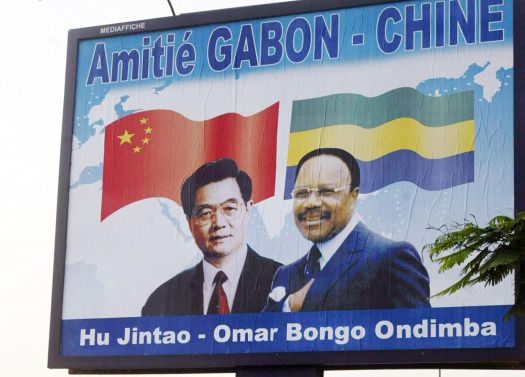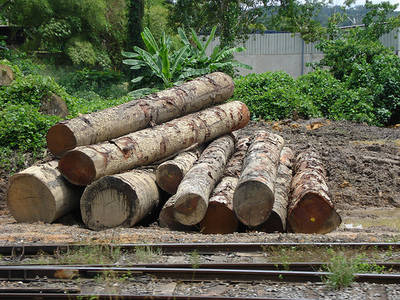[AUDIO] China in Africa podcast: Why the French have the upper hand in Gabon
 Gabon is that tiny country along the central west Africa that is often overlooked by its larger, more controversial and considerably more powerful neighbors. With only 1.5 million people, Gabon is one of Africa’s smallest countries. Along with its modest population, Gabon also maintains a low-profile. Rarely does it make headliness in ways that neighboring Equatorial Guinea does where the ruling family/government there stands accused of widespreadl human rights abuses, corruption on a grand scale and even narcotics trafficking among other indiscretions. Instead, Gabon is a stable, relatively democratic country that is aggressively pursuing foreign investors to drill, mine and harvest its vast reserves of natural resources.
Gabon is that tiny country along the central west Africa that is often overlooked by its larger, more controversial and considerably more powerful neighbors. With only 1.5 million people, Gabon is one of Africa’s smallest countries. Along with its modest population, Gabon also maintains a low-profile. Rarely does it make headliness in ways that neighboring Equatorial Guinea does where the ruling family/government there stands accused of widespreadl human rights abuses, corruption on a grand scale and even narcotics trafficking among other indiscretions. Instead, Gabon is a stable, relatively democratic country that is aggressively pursuing foreign investors to drill, mine and harvest its vast reserves of natural resources.
It’s not surprising the Chinese have recognized Gabon’s potential, particularly in the mining and forestry sectors. 85% of the country is blanketed in thick, equatorial rain forests that has attracted China’s large timber and logging companies. However, Chinese companies, particularly logging firms, face distinctive challenges in Gabon compared to their experiences elsewhere in the region. Unlike in the Republic of Congo, where Chinese logging concessions have aggressively clear cut their way through the country’s supposedly protected national forests, the Gabonese government says it is committed to preserving its national parks. Libreville has designated 11% of its territory, one of the largest such commitments in the world, to be included in its national park system and off limits for development and logging.
“The narrative of the Chinese taking over [in Gabon] is not entirely accurate, what is accurate is that the Chinese presence has grown a lot but it’s [still not very] big.” – Johanna Jansson, researcher, Swedish Institute of International Affairs
The Chinese, though, face a much more daunting challenge in Gabon from France. The French once colonized Gabon and have retained considerable political, economic and cultural influence since independence in 1960. Gabon’s national  language is French, the country’s legal and regulatory systems are inspired by the French and the Chinese must compete against French companies have deep historical ties with Gabon’s elite that go back decades, even generations. In Gabon, as in China, 关系 or guanxi is critical to success and as the newcomers, China’s big state owned companies don’t have very much of it and must work hard to catch up. Currently, the French remain the dominant foreign investors in Gabon and observers do not expect the arrival of the Chinese to have much of an impact on the status quo anytime soon.
language is French, the country’s legal and regulatory systems are inspired by the French and the Chinese must compete against French companies have deep historical ties with Gabon’s elite that go back decades, even generations. In Gabon, as in China, 关系 or guanxi is critical to success and as the newcomers, China’s big state owned companies don’t have very much of it and must work hard to catch up. Currently, the French remain the dominant foreign investors in Gabon and observers do not expect the arrival of the Chinese to have much of an impact on the status quo anytime soon.
Gabon presents an interesting case study for China’s engagement in Africa. Here, it will have to work harder against established international companies, particularly major French conglomerates. Also, with a more stable, less corrupt central government in Libreville, Chinese actors will not have the maneuverability they do in places the Republic of Congo, Mozambique and Madagascar where the legal system is, well, more “flexible.” Here, the Chinese will have to adapt and learn the hybrid Franco-Gabonese political system and cultural norms.
There does not appear a lot of research or news coverage on the Chinese activities in Gabon, but what is available is quite good. Swedish academic Johanna Jansson has done some excellent field research as part of a collaboration among the Centre for Chinese Studies at the University of Stellenbosch in South Africa. Their report provides a great high level overview of Chinese companies operating in the extractive industries in both Gabon and the DRC. Download a PDF of the report here. It’s worthwhile reading. Jansson also wrote an article for South Africa-based Pambazuka News on Chinese Investments in Gabon’s Extractive Industries that provides additional coverage of the issue.


1 Comments
Poster un nouveau commentaire